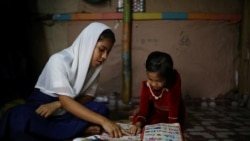Rohingya Broadcast Rohingya “Lifeline” radio - Thursday, October 15, 2020 MC & News: Sami Ahmed & Mohammed Hussain \\arsenic\netexchange$\Bangla\MP3 ROH Lifeline 10152020 1130 UTC Intro Today: Thursday, October 15, 2020 7:30 a.m. (Washington, D.C., USA) News Headlines Duration: 7 minutes · Military Offensive Operation Against AA continues in Rakhine · Anti-Rohingya propaganda on Facebook in Malaysia · Indian Americans solidly behind Biden in U.S. presidential election, survey shows · China, Russia elected to U.N. rights council; Saudi Arabia fails Shortwave: 31-meter band, 9350 kHz; 25-meter band, 11700 kHz and 12030 kHz Medium wave (AM): 1575 kHz Report: VOA News Related item code: 9-P Duration: 5:55 minutes Translator: Mohammed Idris Abdullah (Cox’s Bazar) Topic: In Language Learning, Mistakes Are Not Bad. Sources: https://learningenglish.voanews.com/a/in-language-learning-mistakes-are-not-bad-/5615534.html Summary: English learners should not think that mistakes, or errors, are bad. One American language expert advises that language learners should instead see errors as signs of progress. Alex Poole is a professor of English and interim department head of modern languages at Western Kentucky University. Poole recently spoke with VOA Learning English about errors and language learning. One common problem is that English learners think too much about errors instead of communication. “The goal is to be able to communicate in practical terms. If you have an error, the only time you should worry about it is if it causes communication breakdown,” Poole said. Errors in speaking Poole has some useful ideas about ways English learners can use errors. When you are speaking with a native English speaker, there are two kinds of things you can do to look for errors, Poole said. The first is to look for misunderstanding or other signs of confusion. For example, perhaps a person gives an unusual response to something you said. You can then ask them directly what the problem is. The second works if you know a native speaker well. You can ask them about the kinds of things that you say that could cause communication problems with other native speakers. Errors in writing When it comes to writing, Poole recommends thinking about errors in a different way. He suggests keeping a list of common errors. These might include mistakes with subject-verb agreement, prepositions or articles. When English learners write something, Poole recommends that they think about the main ideas first. Then, he recommends thinking about how to put those ideas in order. Instead of thinking about grammar, he suggests you should think about the big picture of what you are writing about. After you write something, you can go back and use your list to look for errors. Report: Mohammed Rukon Uddin (Cox’s Bazar) Related item code: 9-P Duration: 6:13 minutes Topic: Interview with a Rohingya about youths’ activity during pandemic in the camp and parents concern over their children’s misguidance by not getting any attention by the authorities. Translation Summary: More than half of the population of Rohingyas in the camp are youths and children. Though children are getting some basic temporary education and other facilities but for the youths there is no provision for education. Government agreed to establish education for the youths until grade 9 but the pandemic has halted that process. Mohammad Shafiq is a resident of kutupalong camp. He mentioned how youths are passing their time during this time. He said, “Pandemic has stopped all sorts of preoccupations for the youths,Moreover there is no education for the youths. Parents fear about their young boys and girls that they might be misguided by wrong people and do illegal things. They are urging government of Bangladesh to put their concern on youths in the camp”. Rohingya song Duration: 4:00 minutes Program C
খন্ড
-
![]() এপ্রিল ২৩, ২০২৪
এপ্রিল ২৩, ২০২৪Rohingya Broadcast
-
![]() এপ্রিল ২২, ২০২৪
এপ্রিল ২২, ২০২৪Rohingya Broadcast
-
![]() এপ্রিল ১৯, ২০২৪
এপ্রিল ১৯, ২০২৪Rohingya Broadcast
-
![]() এপ্রিল ১৮, ২০২৪
এপ্রিল ১৮, ২০২৪Rohingya Broadcast
-
![]() এপ্রিল ১৭, ২০২৪
এপ্রিল ১৭, ২০২৪Rohingya Broadcast
-
![]() এপ্রিল ১৬, ২০২৪
এপ্রিল ১৬, ২০২৪Rohingya Broadcast







